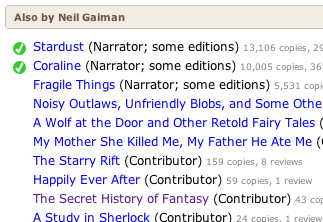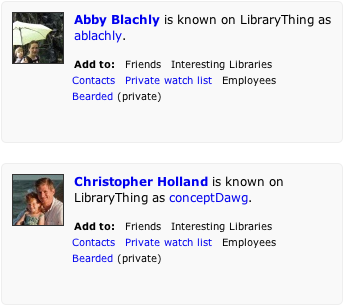
We’ve just pushed some rather major changes to how LibraryThing displays authors, as well as other contributors to a work, like translators, editors, etc. This functionality has been around for a few months for members of the Board for Extreme Thing Advances, but we’ve improved it and released it. We thank them very much for helping us get it right!
LibraryThing has long allowed you to edit and add multiple authors and their “roles” within their catalogs, the so-called “book level.” Now, work pages also include an “Other authors” module with a link to “Add/edit other authors.” Clicking that link will open up a lightbox where you can add, edit, confirm or reject other author entries for that work, assign the various authors to the correct roles, and mark whether they apply to the entire work or to only some editions. By popular request we have also opened up the “primary author” to editing, so you can now edit them, and their roles.
Some examples:
 Other authors who apply to all editions of the work will show up at the top of the work page, like A Passion for Books, where Ray Bradbury wrote the foreword. Authors who contributed to some editions will show up in the “Other authors” section, linked from the top of the page: an example is Keigo Higashino’s The Devotion of Suspect X, showing Alexander O. Smith as the translator.
Other authors who apply to all editions of the work will show up at the top of the work page, like A Passion for Books, where Ray Bradbury wrote the foreword. Authors who contributed to some editions will show up in the “Other authors” section, linked from the top of the page: an example is Keigo Higashino’s The Devotion of Suspect X, showing Alexander O. Smith as the translator.
We’ve also added the ability to edit the name and add a role for the “primary” (ie., “lead”) author of a work, something much-requested during the BETA test of this feature. There’s no real need to do this for single-author books, but for some types of works it’ll be useful. Examples:
 There will, of course, be debate on the issue of main and secondary authors. Generally speaking, co-author or co-editor status falls under the “main author” setting, while most other roles would count as “secondary author.” Obviously there will be exceptions to this, such as a book of photography or artwork where the artist rises to the level of “main author”.
There will, of course, be debate on the issue of main and secondary authors. Generally speaking, co-author or co-editor status falls under the “main author” setting, while most other roles would count as “secondary author.” Obviously there will be exceptions to this, such as a book of photography or artwork where the artist rises to the level of “main author”.
This concept of “other authors” is live across the site, but it will take a while to play out how it should appear everywhere. But we wanted to get it out there and let you all have a go.
Come talk about the feature here, or report bugs here.
The changes prompted but do not require a change to how book/work pages show their book- and work-level data. This question is being discussed here.










